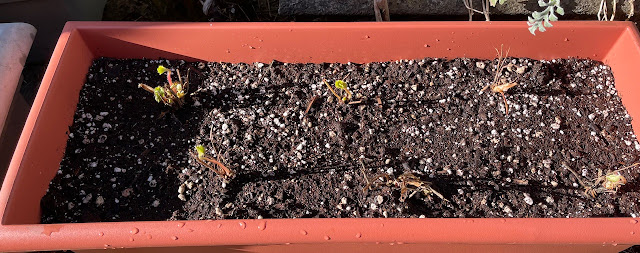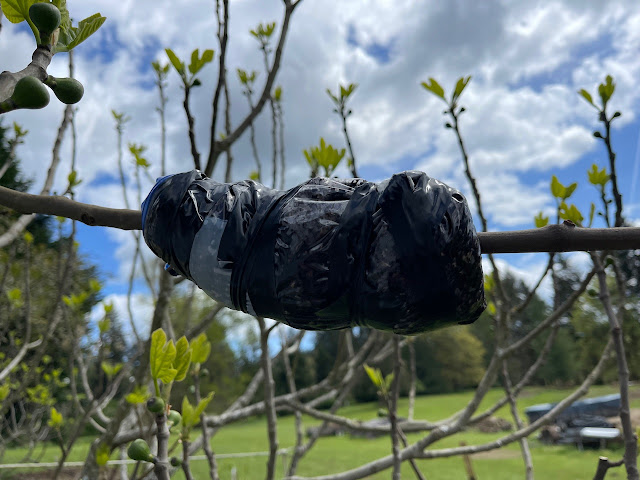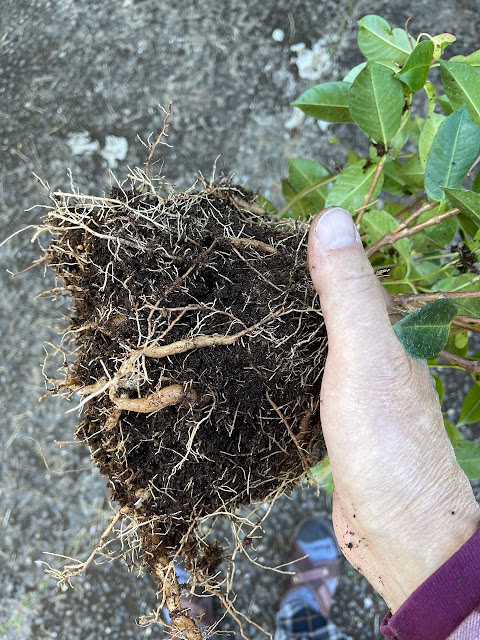I've been working on Wild Fire Risk Mitigation for the house. This year is predicted to be hotter, dryer, earlier. That means more wildfires or wildfire potential in my area. Over the past few years, I've evacuated twice for wildfires, although they did not reach my immediate area.
One aspect of reducing wildfire risk to the house is to have cleared zones of no flammability, or reduced. For an area of the foundation, to five feet from the house, all flammable trees and shrubs need to be completely removed. Mulch should be replaced with stone, lava, or gravel (I have some areas with cement patio or driveway, which is great). The second zone is 5 to 30 feet from the foundation. That needs to have only scarce, widely spaced not-very-flammable vegetation, with pruning up to 10 feet above the ground, and short cut grass under 4" tall. That's the fig tree area. I don't think it's too bad, but I want to make it better. My goal is, in the long run, to have only low- mowed grass there. Remove the trees.
It doesn't have to be this minute. Today I moved the very- small tissue - cultured Chicago Hardy fig tree, to the other fig grove that is far away from any structures.
The Carini and LSU Tiger have not been productive. I keep them for sentimental reasons, and "in case" they ever perform better. I'll let them bear this summer, if they do. Most likely, they'll get cut down completely. No need to "hoard" fruit trees that don't produce.
White Sicilian is pretty good. It is small enough to dig up and move this fall. Also, it might be outside that 30 foot limit.
That leaves Lattarula, which is highly productive, highly reliable, both breba and main crop, delicious flavor. I don't think I'm up to moving it. Too big. Cuttings can take a long time. What I hope is that by air layering a larger branch, I can start a much larger new tree than by taking cuttings.
There are multiple videos and websites about air layering figs. I used this one. Basically, cut a band around a branch, removing bark and cambium.
Have a pre-prepared quart zipper bag, filled with wet potting soil. Cut one side of the bag. Wrap the open part of the bag around the cut, such that the tree cut is completely in contact with and surrounded by potting soil. Then wrap the bag firmly around the branch. Tightly tie or wrap it in place. I used electrical tape.
Now wrap tightly with aluminum foil, to exclude sunlight. Now it looks like a burrito tree.
I removed all of the starting figs on that branch, so all of the energy can go to growing roots. I tied it so it wouldn't droop so much.
Now it looks like a burrito tree.
Will it work? I don't know. According to various websites and videos, we should get a good mass of roots in six to eight weeks.
I'll do a few more, just in case. Here I used one-year-old growth. I'd also like to try an older, bigger branch to see if that gives a better head start.
















